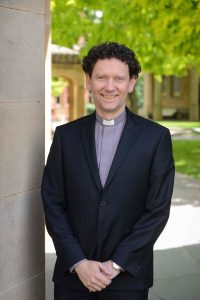 I wrote last time about a film from my childhood, The Goonies, in which the main characters, a group of children, are hunting for hidden treasure. Yet, the key discovery they make on their journey is their love and compassion for each other. They also show great love and compassion for someone they meet on their adventure. The children discover what it is to be loving human beings. It’s something, which is more important than anything else –much more important than the treasure they were hunting for.
I wrote last time about a film from my childhood, The Goonies, in which the main characters, a group of children, are hunting for hidden treasure. Yet, the key discovery they make on their journey is their love and compassion for each other. They also show great love and compassion for someone they meet on their adventure. The children discover what it is to be loving human beings. It’s something, which is more important than anything else –much more important than the treasure they were hunting for.
Love is the real treasure in life. If we find that treasure, God’s love expressed through the love of other human beings, it is worth more than anything else in the world.
That is also one of the meanings behind many of Jesus’ parables: discovering God’s love and expressing that love towards other human beings. In many of his parables, the key purpose behind them is to get the listener to question himself or herself, “What will be my response to God’s love?”
Having told the parable of the hidden treasure and the pearl of great price, Jesus goes back to his hometown of Nazareth. As an aside, the city of Nazareth is still there in the northern part of Israel. It’s a very interesting city these days: approximately 80,000 people live there, so it’s just a bit smaller than Bendigo in Victoria. Today approximately 69% of the population is Muslim, even though it’s in the state of Israel (which is mostly Jewish or secular) and approximately 31% of Nazareth is Christian. It’s one of the relatively few cities left in Israel or Palestine where there is still a significant Christian population.
In the time of Jesus, of course, the inhabitants were almost all Jewish, apart from the Roman soldiers who would have been stationed there. Jesus goes to the place of worship, the Synagogue, (remembering that Jesus was also Jewish). The people of his hometown are amazed at him, to start with. This is unsurprising, because everywhere else he has been, crowds of people have flocked to listen to him. In fact, on one particular day in this early part of his ministry, Jesus was so popular that he was forced to get into Peter’s boat to teach, because there were just too many people trying to get close to him.
Jesus has been incredibly successful, and then he goes back home. It’s a tougher crowd. The people listen, to start with, but then they say, “Hang on, this is just the carpenter’s son, he grew up here in Nazareth, we know his mother, Mary, and we know his brothers and sisters. What on earth can he tell us?” They stop listening. We know that his mother Mary, listened to him, and we know that his half brother James listened to him, because he gets mentioned by name later in the book of Acts. But the rest of the people in Nazareth? Most of them stop listening. They miss out on hearing what he has to say: they fail to hear his absolute basic message, “God loves us and wants us to love other people”.
I wonder if you have ever had the same experience, when you’ve actually had something significant or important to say, but have been dismissed because your audience has known you too well? Sometimes the home crowd is the toughest. One of the interesting things about the Adelaide music scene, for example, is that you almost have to go away and be successful overseas, before you then come back and people say, “Hey this person’ really good!” That’s a bit of an Australian thing, I think: we still tend to think, “Oh, you must only be a good author, or musician, or scientist, if you’ve studied overseas or had success overseas.” I think we’re slowly realising that that’s not true, but it’s taking a while.
Sometimes the most beautiful music, the most wonderful art, the best science, and the most hopeful message about love, is the one we hear closest to home, but you have to be prepared to pay attention.
The Reverend Dr Theo McCall
School Chaplain
